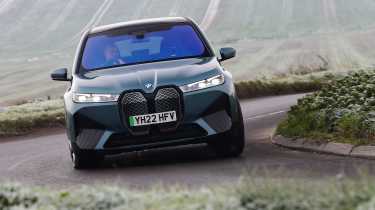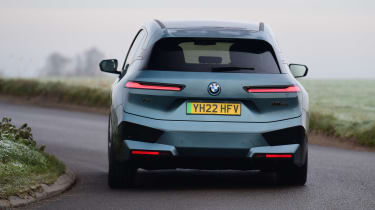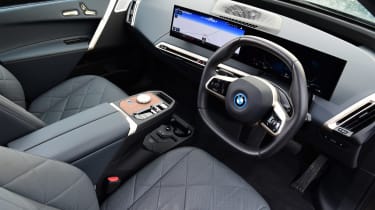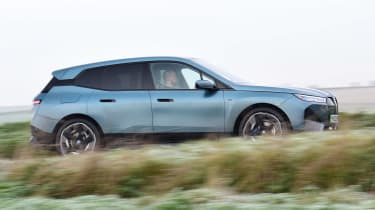BMW iX M60 2024 review – it's fast, but is it worthy of the M badge?
BMW's range-topping electric iX SUV is an electric tour-de-force undermined by the diminishing returns of its high specification
The BMW iX M60 is a flagship variant of the iX SUV that itself is designed to represent the pinnacle of BMW’s electric car development. Its carbonfibre-reinforced chassis is bespoke, its design both eccentric and finely wrought, with this M60 form adding more powerful electric motors to the recipe. But at £124,605, is it worth over £53,000 more than the entry-level iX?
Key differences to the new M60 reside almost exclusively around its powertrain. It picks up the larger of the iX’s two battery options as standard, with 111.5kWh of gross capacity. This powers an electric motor on each axle that together produce a peak combined figure of 610bhp, 87bhp more than the xDrive50 variant that previously topped the range. As ridiculous as it sounds, the M60’s figures aren’t unusual for a six-figure electric SUV, so it will hit 62mph in a brisk 3.8sec.
> BMW i5 and 5-series Touring revealed – here’s what to expect from the M5 estate
Unlike the Audi Q8 E-tron S it rivals, the M60 doesn’t utilise any clever torque vectoring between the rear wheels, but its 340 to 350-mile range is a significant improvement over the Audi’s 284 miles – a figure that’s already been improved in a mid-cycle update. In our experience this estimated range is more or less accurate, with mixed driving returning an average efficiency figure of 2.8 miles per kWh.
More reviews
The suspension and chassis hardware is otherwise unchanged, featuring a combination aluminium space frame and carbon composite chassis with exposed carbon elements in the sills and door shuts. There’s also carbon in the roof and tailgate support structure, helping keep weight down to, erm, 2595kg. It rides on a combination of air springs and adaptive dampers, plus comes with a rear-wheel steering system, too.
Visually the M60 is a sight to behold. It’s big, yes, but also full of visually awkward angles and odd design elements offset with high-quality detailing and sharp, modern LED lighting. Compared to standard M Sport iX models, the M60’s gold detailing is about the crux of its upgrades, but retains an imposing design that’s already earned it passionate fans and critics in equal measure.
Step inside and it’s easy to see why the standard iX has already proven to be such a sales hit. The iX M60 really does feel like the future, with a pleasantly airy interior that’s both sumptuous and minimal. It finds an enviable balance that Audi and Mercedes-Benz have yet to nail in any of their recent EVs. The interior is only enhanced in the way BMW’s technology is so artfully integrated into the cabin design, and it’s all of such high quality that it helps the M60 almost feel worth its not inconsiderable price tag. Seat bolstering could be more aggressive given the performance stance, and the crystal central gear selector does occasionally catch the sun in bright conditions, but these are things we can learn to live with...
This feeling of quality is maintained the moment you pull away. The powertrain is quiet – you’d expect that of an all-electric car – but its calibration is also excellent, with a natural and very responsive throttle. Drop back to comfort mode and there's an impressive change in response, softening its edge for a more relaxed driving style. And refinement is astoundingly good, beyond even that expected of a high-end EV with little to no road, wind or suspension noise. The iX almost feels like it’s gliding through space in a vacuum, with only varying levels of Hans Zimmer-designed noise being the indication that you’re building speed.
The steering ratio is very quick, something accentuated by the standard-fit rear-wheel steering system. Despite the odd octagonal steering wheel it still feels very natural, and helps an otherwise massive car feel considerably smaller than its dimensions suggest. It also has outstanding outward visibility – that low window line might look a little van-like, but it reaps benefits.
Pick up the pace and there’s a slickness and composure that the iX M60 shares with its lower-spec siblings. The comparatively large 22-inch wheels have no detrimental effect on ride quality, and regardless of the chosen driver mode the body remains flat, composed and directionally stable. Change over to Sports mode and you’ll feel the ride busy as small bumps make their way into the cabin, but the upside is even more lateral stability.
The powertrain has a noticeable rear bias to its torque delivery that makes the iX M60 feel agile and sportier than you’d expect. It’s still a far cry from being fun to drive, but is impressively resolved and comes with a distinct dynamic character that helps it feel like a BMW. The iX’s weight comes into play when a solid prod of the brake pedal is required from high speeds, though.
There is another ‘but’ when it comes to the iX M60, and it’s that all of its best bits are also found on the iX’s considerably cheaper models. The M60’s increase in performance is noticeable, but as with all EVs it remains more of a gimmick than useful commodity. The M60 has no useful new traits, so shines brightly only because the standard iX is such an accomplished engineering exercise.
If an electric SUV is a must, we can think of none better than an iX. However, we’d suggest that you stick to an entry-level version, pocket the £50k saving and put it towards something else. An FL5 Honda Civic Type R, perhaps...
Prices and rivals
In 2024, the BMW iX range kicks off at £70,985 for the xDrive40 Sport single-motor variant with the smaller 76.6kWh battery pack. This makes the £124,605 for the M60 feel like a big leap for a car that offers little more in reality. Equalise the battery packs and the 516bhp xDrive50 M Sport model still only just breaks the £100k mark at £104,285.
Audi’s Q8 E-tron is little more than a mid-life update on its original EV SUV previously called just E-tron. We’re yet to drive it in the UK, but the comparable E-tron S sits slightly below the M60 in both power and price points. It does have a third electric motor, an active anti-roll system and just as much kit, but unless it reveals a big step up over the older model it won’t be nearly as good to drive, as refined or well built.
Merc’s new-generation EQ SUVs are poised to replace the ageing and uncompetitive EQC, but it’s Polestar’s new 3 SUV that arguably has the greatest interest behind it as we get closer to its UK launch.



